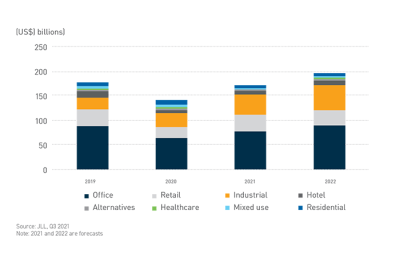How can commercial real estate hedge against inflation?
Inflation can be detrimental to an investor as it chips away at savings and investment returns. Where inflation picks up, investors often turn to real assets such as real estate as a hedging strategy. Here, we outline a number of ways in which commercial property can act as a hedge to inflation.
Value increase for existing stock
An upside for investors is that inflation can lead to an increase in property values.
Rising inflation can lead to an increase in the cost of building materials for developments in one of two ways. First, should interest rates rise, it would lead to higher borrowing costs and resultingly, increases in the cost of building materials for developments.
Second, and most relevant in the current environment, supply constraints have made access to building material increasingly scarce, thereby driving prices up.
Both of these factors lead to new construction becoming increasingly less attractive or viable. As a result, this can limit the supply pipeline and increase the price for existing properties.
Value-add office strategies an alternative to new builds
According to JLL, demand and occupancy throughout the pandemic of modern, quality office stock has outperformed the market as COVID-19 has heightened awareness of health, safety and sustainability. As construction of new stock is strained, this will likely result in an uptick in value-add strategies to redevelop or retrofit older stock with a particular focus on occupant wellness.
Lease structure
Commercial property leases can include fixed annual rental increases, giving investors an income boost that offsets the effects of higher inflation. It is common for annual rent increases to be set above the long-term inflationary outlook, or even specifically tied to increases in inflation.
For example, a long-term lease to a government tenant in an office building might have annual rent increases structured at a fixed rate plus CPI inflation. For quality, well-located stock in an environment with heightened demand due to less stock coming to market, landlords are in a position to charge higher rent.
The downside is that if inflation is too high, it is harder for investors to capture rental growth at or above inflation, resulting in a hit to income streams.



